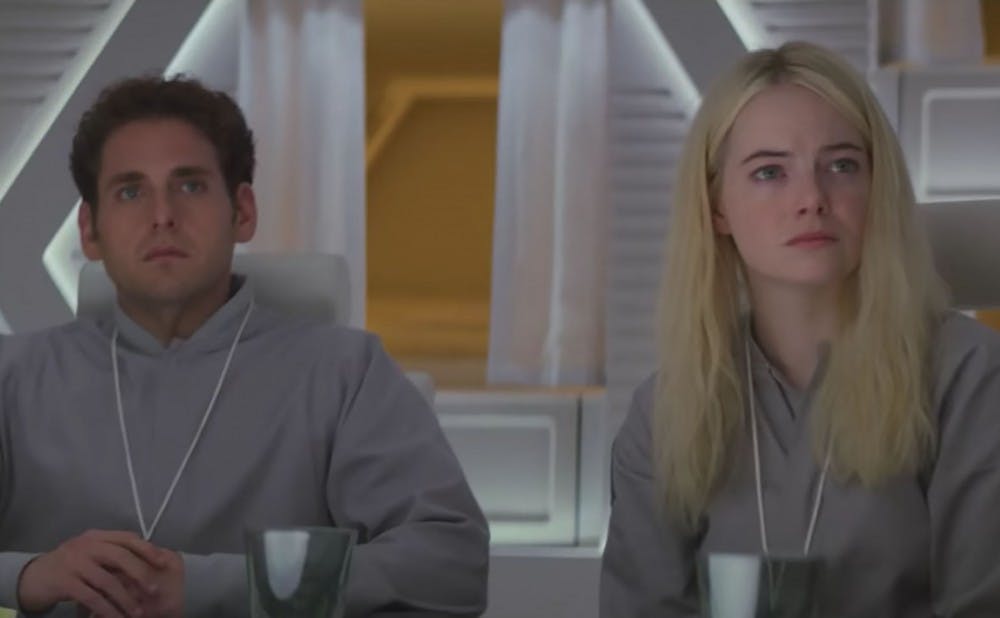“It begins like this,” says the soothing voice over as “Maniac” opens with the colorful image of an amoeba. But wait, that isn’t the beginning — we need to go back even farther.
Too many “connections” have been skipped and you need to be taken back even further — so the show introduces the idea of an “infinite cosmic orgy,” or The Big Bang Theory. What ensues is a description of the creation of the world as we know it with comically sexual references. Trippy images of amoebas becoming plants, plants morphing into clouds, clouds into animals and animals into humans. We are launched into a world parallel to our own, and yet altogether unfamiliar. And if what I’ve described has confused you, well that’s what Netflix’s “Maniac” is in a nutshell — an infinitely disorienting, and yet aesthetically alluring spectacle.
The 10-episode miniseries is set in a retro-futuristic New York City, with similarities largely resembling that of a 1980s science fiction b-movie: computers that look like they have been taken straight from the set of “Back to the Future” coexist alongside an AI Supercomputer capable of empathy, a friend proxy service sends actors who pretend to your friend, advertisements are replaced with “Ad Buddies” — real people who follow you around and bombard you with ads — and people chain smoke as if it can’t cause fatal disease.
In an statement given to Indiewire, Director Cary Joji Fukunaga said the show is essentially set in a new plane of existence that mirrors our own.
“As [creator Patrick Somerville] and I started working on it, I think we both thought that the real world should also be a heightened reality, and I don’t think we knew exactly why we were doing that, initially,” Fukunaga said. “It just felt like an instinct.”
The show follows addict Annie Landsberg (Emma Stone) and schizophrenic Owen Milgrim (Jonah Hill) as they participate in a pharmaceutical drug trial led by Doctors Azumi Fujita (Sonoya Mizuno), James K. Mantleray (Justin Theroux), and Robert Muramoto (Rome Kanda). The drug aims to rid the need for therapy and cure all mental health problems. As Dr. Mantleray puts it, the procedure ”will unlock the secret mysteries of the mind and replace old-fashioned talk therapy ... forever.”
Unfortunately, during the study tragedy strikes, and the empathetic computer system malfunctions, intertwining Owen and Annie’s psyches and creating multiple realities that range from a lemur kidnapping in Long Island, to a seance in the 1940s, to becoming a mafia member, a medieval tour guide, an Icelandic Spy and CIA operative. The end result is an interesting medley of sound and visuals, and the production of a genre-hopping series with nods to government thrillers, fantasy adventures, crime dramas and more. It’s basically a funnier version of “Inception.”
Despite the cinematic feel, all the different elements often resulted in a hard to follow, bizarre plot. There were times when it felt like the show was trying to be so unconventional that explanations were foregone and plotlines were left unfinished. At one point, it is implied that Dr. Marumoto is addicted to reliving his old traumas — similar to Stone’s character — but no further information is given and the topic is never revisited. This was especially true of the first episode, where lines such as “anonymous hammerhead” and “12-bullet short-termer” are used freely and without definition. Their meanings can’t be derived with context because the context is just as puzzling. At one point a Russian tour guide introduces a Statue of Extra Liberty that has wings and wields a sword — a 10-second detour mentioned once and never addressed again.
Underneath all of the surrealism and quirkiness, at its core the show broadcasts themes of acceptance and connection. Both Owen and Annie are haunted by their past trauma, but by series end both characters are able to learn from their experiences, and look forward to the future.
All in all, “Maniac” is a moving commentary on the chaos we so often see in society and the importance of moving on and moving forward — a story of growth and learning from your mistakes.
Get The Chronicle straight to your inbox
Signup for our weekly newsletter. Cancel at any time.

